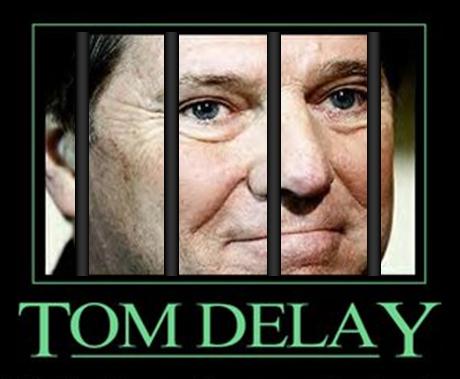 Tom Delay has been convicted of money-laundering by a Travis County jury.
Tom Delay has been convicted of money-laundering by a Travis County jury.
After three days of deliberation in former House Majority Leader Tom DeLay‘s corruption trial the jury returned a verdict of guilty.
Tom DeLay‘s defense team, presented five witnesses over two days, resting its case last Thursday.
This was in stark contrast to the prosecution’s case, which included more than 30 witnesses in 10 days. The former Houston-area congressman did not testify. Closing arguments in the trial were delivered on Monday, and jurors began deliberation later that day.
Shortly after convening, jurors sent two notes to the judge, asking him about the charges. “Can it constitute money laundering if the money wasn’t procured by illegal means originally?” one note read. A second note questioned whether money laundering can involve funds that were not initially accepted for an illegal purpose. Judge Priest expressed concern about how to answer the jury’s questions without commenting on evidence in the case. In the end, he declined to answer the question telling the jury to figure it out for themselves.
Earlier today (the third day of deliberation), the jury asked for multiple copies of the transcript of Tom DeLay’s interview with prosecutors in 2005. Then later during the day, a question from the jury elicited an instruction from the judge that could have been the final blow to DeLay’s defense. The jury basically asked whether DeLay had to know about a conspiracy to commit money laundering before it began. Visiting District Judge Pat Priest told them no.
At 5 pm today, the jury returned a verdict of guilty on both charges of money laundering and conspiracy to commit money laundering.
Currently Delay is out on a previous bond, but his conviction means he faces five years to life in prison on the money laundering charge and two to 20 years on the conspiracy charge. He also would be eligible for probation.
The sentencing phase of the trial is tentatively scheduled to begin December 20, 2010 and DeLay has chosen to have Senior Judge Pat Priest sentence him.
DeLay’s lawyers intend to appeal the felony criminal conviction. One thing is clear, he will not be returning to politics anytime soon.
Earlier this year, DeLay tried to get his case moved out of Travis County. He argued he could not get a fair trial in Austin because of the role he played in the 2003 Texas redistricting efforts. Obviously the venue change request was denied, and from the outside it seems clear that this Travis County jury took its task to heart, and deliberated fairly and judiciously before bringing back a guilty verdict.
I expect this will be one of our Thanksgiving dinner topics tomorrow. In the meantime, whether or not you and your loved ones make this a Thanksgiving topic to go along with your holiday turkey (tofurkey for you vegetarions among us) dinner. . . Public Citizen wishes each and every one of you a safe and happy holiday.
###
By promoting cleaner energy, cleaner government, and cleaner air for all Texans, we hope to provide for a healthy place to live and prosper. We are Public Citizen Texas.













